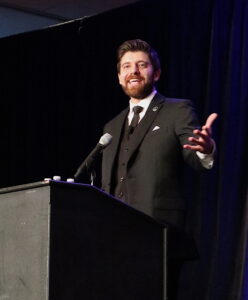
CCA Conference 2023: Inspiration in Tucson
By Adam Freill
Commercial Construction Industrial Infrastructure Institutional LeadershipCollaborative approaches, carbon reduction, chocolate and peace highlight the opening day of the 2023 Canadian Construction Association Annual Conference.

Tareq Hadhad, CEO of Peace by Chocolate, at the Canadian Construction Association’s 2023 conference in Tucson, Ariz. (Photo by On-Site Staff)
“It is our moral responsibility to lift others to success,” said Tareq Hadhad, CEO of Peace by Chocolate, during his opening keynote presentation at the Canadian Construction Association’s annual conference in Tucson, Ariz.
Hadhad, whose family immigrated to Canada in 2016 as refugees fleeing war in Syria, left delegates inspired as he shared his life story that found him navigating a strange new home, facing barriers that many new Canadians face, but also surrounded by friendly people who exhibited the passion, empathy and kindness that he spreads with his message of building up and spreading peace and happiness — through chocolate.
After losing the family’s chocolate factory in Damascus to a bombing during the war, his family fled from Syria to Lebanon where they spent three years as refugees in search of a new home. A chance conversation with a taxi driver in that country led to Hadhad applying to enter Canada. “He will never know the impact that he had on my life,” reflected the CEO.
After being sent to Antigonish, N.S., the family started doing what they knew how to do: make chocolate and live up to the family’s values of giving back and contributing.
The company, started in a modest residential kitchen, is now the third-largest employer in Antigonish, and is the fastest growing chocolate company in Canada. “We didn’t come here to take jobs. We came here to create them,” he said, adding that his family are now proud Canadian citizens who have used their story, message and values to give back both in Canada and abroad. A recent company initiative raised more than $150,000 for humanitarian efforts in Ukraine.
“My father believed that chocolate was the official language of happiness,” said Hadhad, adding with enthusiasm, “We are not in the business of chocolate; we are in the business of peace.”
After receiving some helpful advice from Hadhad about how to help new Canadians working at delegates’ companies, attendees were well prepared to jump into the day’s business sessions.
Looking at how construction companies can ready themselves for net-zero and green public procurement, Jen Hancock, vice-president of collaborative construction at Chandos Construction, queried the audience about how many of their companies are tracking their greenhouse gas footprints.
She explained that the first steps on this path can be tracking the fuel used by its employees and the electricity used in its operations, with more advanced tracking also incorporating greenhouse gas from the supply chain and tracking Environmental Product Declarations (EPDs) for the materials used in a project.
Likening that focus to the skills shown by high-level hockey players who focus more on where the puck will be than where it is currently at on the rink, she explained, “Tracking those is where the puck is going.”
Her co-panellist, Stephan Dery, of Public Services and Procurement Canada, outlined how the federal government’s commitment to Net-Zero by 2050 will influence selection of materials as carbon reduction becomes a key factor for the industry. “Government infrastructure has always been a catalyst for change,” he said, adding that operational cost considerations are moving the conversation away from lowest cost toward best value.
In the afternoon’s look at procurement pain points, and opportunities, EllisDon’s Wayne Ferguson moderated an insightful discussion with panellists Olivia MacAngus (Colliers Project Leaders), Ellowyn Nadeau (Winnipeg Construction Association) and Melinda Nycholat (Defence Construction Canada).
Among the many challenges the industry is facing are inconsistent use of technologies like BIM, variance in Request for Proposal structures and procedures, and training of new people on procurement procedures, but the panel also included mentions of some bright spots, such as the movement towards more sharing of risk and the use of more collaborative delivery models that help build trust amongst a project’s key stakeholders.
“I am a big advocate of integrated project delivery, because there is complete transparency,” said Nycholat. “I think we need to continue that evolution.”

From left: Nicole Chabot, Jean-Paul Gauthier and Todd Winterhalt talk about infrastructure needs within Canada. (Photo by On-Site Staff)
Speaking during the look at trade-enabling infrastructure, Todd Winterhalt, senior vice-president of Export Development Canada, stated, “We have bottlenecks within the country that work against us.”
Fellow speaker Jean-Pierre Gauthier pointed at the building of Canada’s national railway system and the TransCanada Highway as nation-building projects that would not have been possible if they were pieced out with multi-layered approval processes as each region and jurisdiction used its own vetting processes. Citing a need for infrastructure works that will facilitate the movement of goods both within Canada and for export, he stated, “You need to have a plan for the entire country.”
Winterhalt said that expansion of western ports are a step in the right direction, but that more transportation infrastructure is necessary, adding that the return on such investments is extremely positive, with expanded job opportunities and increased GDP.




